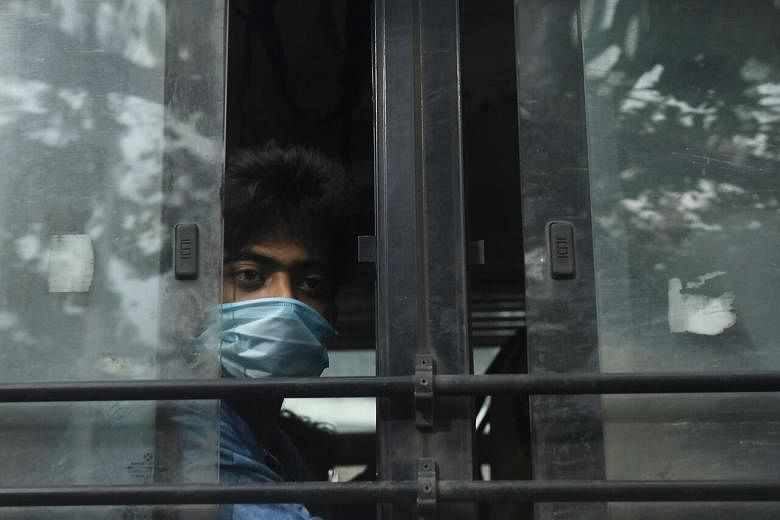NEW DELHI - Mr Tarun Tilokani was getting ready to travel to Boston University to start a Master of Business Administration (MBA) degree, when the coronavirus pandemic upset his plans.
"I am very eager to go to the US. My thing is, I don't want to do an MBA online. It would dilute the whole experience," said Mr Tilokani, 26, who works in sales for a tech start-up.
Mr Tilokani is not alone in his dilemma as uncertainty spreads across the academic world, with education institutes hit by coronavirus restrictions, travel bans and social distancing norms.
Many American and British universities, among others, have yet to reveal whether they are opening with physical classes for the session starting in September or if they will start with online classes.
Some colleges have announced online classes and are also allowing students to defer admissions.
"So I am getting documentation ready. If they say we are going online then I will start thinking about whether to defer or not. Everyone is in the same situation, nobody knows what is happening," he said.
India is a major source of foreign students overseas, with Indian students pursuing higher education programmes abroad making up an estimated 1.09 million, according to figures from July 2019 from the Ministry of External Affairs.
Hundreds of thousands of Indian students opt to study overseas because of tough competition to get into top-ranked education institutes back home, or for the opportunity to study and work abroad.
A report by QS IGAUGE, which rates colleges and universities in India, found Covid-19 has impacted the decision of 48.46 per cent students who wanted to study abroad in the recent past.
A larger portion of non-Stem (science, technology, engineering and mathematics) students have reconsidered their decision than those pursuing Stem courses, the report said, noting "the significantly lower return of investment in an already expensive international higher education domain coupled with further reduced chances of employability in the post Covid-19 world play a role in changing study patterns".
Education consultants said they were seeing students opt out of going abroad, although the desire to do so remained strong.
Seven out of 10 students coming to him have opted out of going in the autumn or deferred their decision till next year, said Mr Anirudh Gupta, director of Mindways Consulting, a Delhi-based education consultation service. "Students are keeping it open. People are applying because it doesn't cost much. But no one is committing yet."
Mr Gupta noted that inquiries for US colleges, which attract the most number of Indian students, had also gone down with US President Donald Trump speaking of tightening work visa norms.
"Students will still apply to top universities like a Stanford or a Harvard, Trump or no Trump. But mid-level schools have taken a massive beating."
In the United States, Indian students are the second-largest source of foreign students, after China.
A total of 202,014 Indian students went to study in the US between 2018 and 2019, according to the 2019 Open Doors report conducted by the US-based Institute of International Education (IIE).
Still some education consultants maintained many of their students were going ahead with plans to study overseas in spite of the Covid-19 situation.
Mr Rajiv Ganjoo, founder of Admitas, a Mumbai-based consultancy, said he was telling those who were nervous to defer study plans. "I have said (to my students), in case its scary and the university is in a region which is most affected (by the coronavirus), we tell them if you have the option from university push it to January or summer or June of next year," he said.
Professor Tan Ooi Kiang, Associate Provost (Undergraduate Education) of Nanyang Technological University (NTU) in Singapore, said: "Interest in NTU's undergraduate programmes remains strong." He also noted demand from Indian students had increased by less than 5 per cent between 2019 and 2020.
For students, uncertainty also centres around when India will resume international flights, with Civil Aviation Minister Hardeep Puri saying international travel will resume when the situation normalises.
India has emerged as among the top 10 countries impacted by the coronavirus, with over 200,000 cases. And while a stringent lockdown has been eased, it has also adversely impacted the Indian economy, with resulting job losses.
According to the Centre for Monitoring Indian Economy, the monthly unemployment rate in May was 23.48 per cent, up from 8.74 per cent in March.
Under these circumstances, Mr Rishab Jain, who is based in Mumbai, believes this is the right time to learn new skills.
"The market is distressed right now and there is a shortage of jobs. Most of the companies I have been speaking to or my friends are in have put on hiring freezes," said the 26 year old who works in the financial technology sector and is going to study at London's Imperial College Business School
"It is better to upskill yourself with an advanced degree right now."












